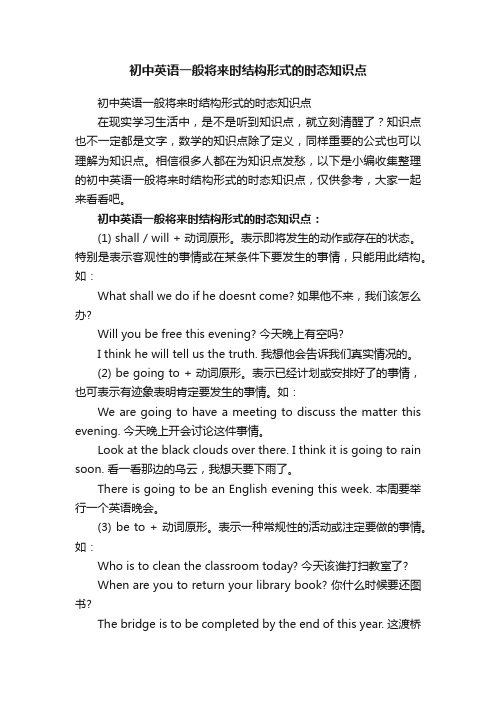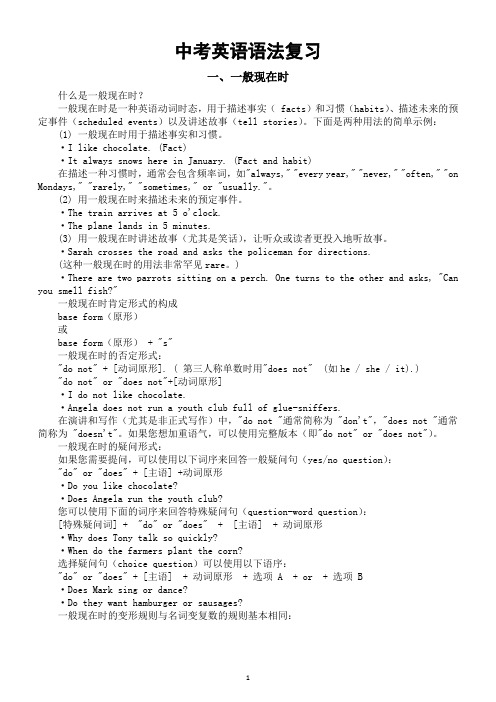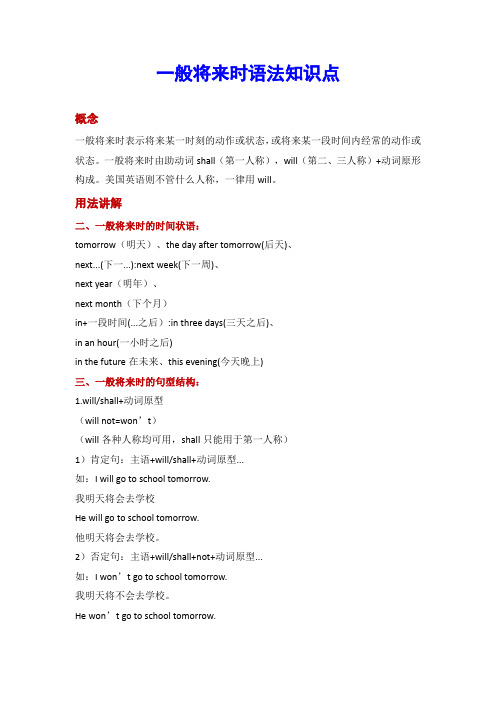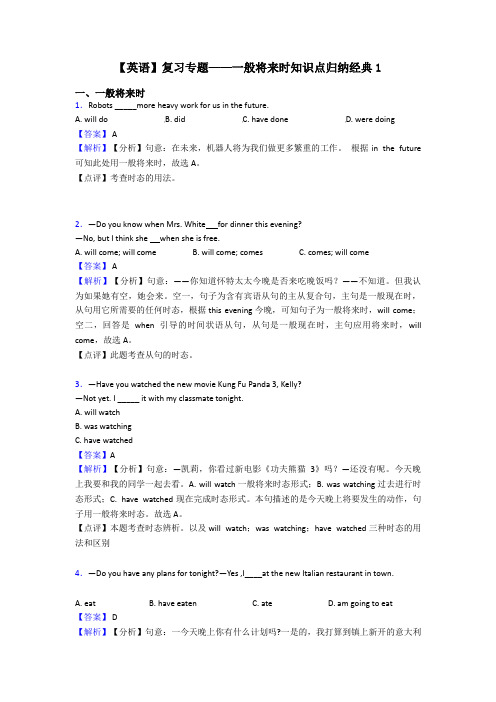中考英语总复习一般将来时知识点总结
中考英语讲练一体讲义11(一般将来时)

【讲通练透】考点11 一般将来时命题趋势:动词的时态是中考出现频率较高的语法项目之一。
考题多以具体的语境为主,体现了对语法知识、语境理解、语言交际能力的综合考查。
中考考查重点:1. 了解并能运用常考的六种时态,尤其熟练运用一般现在时、一般过去时、进行时等高频时态;2. 正确辨析几种易混时态的区别。
一般将来时主要构成形式一般将来时表示将来某个时间要发生的动作,事情或存在的状态,也表示将来经常或反复发生的动作或事情。
1. will/shall+动词原形,shall用于第一人称,常被will 所代替。
will在陈述句中用于各人称,在征求意见时常用于第二人称,will not=won’t,shall not=shan’t。
Which paragraph shall I read first? 我先读哪一段呢?Will you be at home at seven this evening? 今晚七点回家好吗?2. be going to +不定式,表示将来。
a. 主语的意图,即将做某事。
What are you going to do tomorrow? 明天打算作什么呢?b. 计划、安排要发生的事。
The play is going to be produced next month。
这出戏下月开播。
c. 有迹象要发生的事。
Look at the dark clouds, there is going to be a storm. 看那乌云,暴风雨快来了。
3. be +不定式表将来,按计划或正式安排将发生的事。
We are to discuss the report next Saturday. 我们下星期六讨论这份报告。
4. be about to +不定式,意为"马上做某事"。
He is about to leave for Beijing. 他马上要去北京。
注意:be about to do不能与tomorrow, next week等表示明确将来时的时间状语连用。
初中英语一般将来时结构形式的时态知识点

初中英语一般将来时结构形式的时态知识点初中英语一般将来时结构形式的时态知识点在现实学习生活中,是不是听到知识点,就立刻清醒了?知识点也不一定都是文字,数学的知识点除了定义,同样重要的公式也可以理解为知识点。
相信很多人都在为知识点发愁,以下是小编收集整理的初中英语一般将来时结构形式的时态知识点,仅供参考,大家一起来看看吧。
初中英语一般将来时结构形式的时态知识点:(1) shall / will + 动词原形。
表示即将发生的动作或存在的状态。
特别是表示客观性的事情或在某条件下要发生的事情,只能用此结构。
如:What shall we do if he doesnt come? 如果他不来,我们该怎么办?Will you be free this evening? 今天晚上有空吗?I think he will tell us the truth. 我想他会告诉我们真实情况的。
(2) be going to + 动词原形。
表示已经计划或安排好了的事情,也可表示有迹象表明肯定要发生的事情。
如:We are going to have a meeting to discuss the matter this evening. 今天晚上开会讨论这件事情。
Look at the black clouds over there. I think it is going to rain soon. 看一看那边的乌云,我想天要下雨了。
There is going to be an English evening this week. 本周要举行一个英语晚会。
(3) be to + 动词原形。
表示一种常规性的活动或注定要做的事情。
如:Who is to clean the classroom today? 今天该谁打扫教室了?When are you to return your library book? 你什么时候要还图书?The bridge is to be completed by the end of this year. 这渡桥该在今年年底前完工。
初中英语2024届中考语法复习一般现在时和一般将来时知识讲解

中考英语语法复习一、一般现在时什么是一般现在时?一般现在时是一种英语动词时态,用于描述事实( facts)和习惯(habits)、描述未来的预定事件(scheduled events)以及讲述故事(tell stories)。
下面是两种用法的简单示例:(1) 一般现在时用于描述事实和习惯。
·I like chocolate. (Fact)·It always snows here in January. (Fact and habit)在描述一种习惯时,通常会包含频率词,如"always," "every year," "never," "often," "on Mondays," "rarely," "sometimes," or "usually."。
(2) 用一般现在时来描述未来的预定事件。
·The train arrives at 5 o'clock.·The plane lands in 5 minutes.(3) 用一般现在时讲述故事(尤其是笑话),让听众或读者更投入地听故事。
·Sarah crosses the road and asks the policeman for directions.(这种一般现在时的用法非常罕见rare。
)·There are two parrots sitting on a perch. One turns to the other and asks, "Can you smell fish?"一般现在时肯定形式的构成base form(原形)或base form(原形) + "s"一般现在时的否定形式:"do not" + [动词原形]. ( 第三人称单数时用"does not" (如he / she / it).)"do not" or "does not"+[动词原形]·I do not like chocolate.·Angela does not run a youth club full of glue-sniffers.在演讲和写作(尤其是非正式写作)中,"do not "通常简称为 "don't","does not "通常简称为 "doesn't"。
一般将来时语法知识点

一般将来时语法知识点概念一般将来时表示将来某一时刻的动作或状态,或将来某一段时间内经常的动作或状态。
一般将来时由助动词shall(第一人称),will(第二、三人称)+动词原形构成。
美国英语则不管什么人称,一律用will。
用法讲解二、一般将来时的时间状语:tomorrow(明天)、the day after tomorrow(后天)、next...(下一...):next week(下一周)、next year(明年)、next month(下个月)in+一段时间(...之后):in three days(三天之后)、in an hour(一小时之后)in the future在未来、this evening(今天晚上)三、一般将来时的句型结构:1.will/shall+动词原型(will not=won’t)(will各种人称均可用,shall只能用于第一人称)1)肯定句:主语+will/shall+动词原型...如:I will go to school tomorrow.我明天将会去学校He will go to school tomorrow.他明天将会去学校。
2)否定句:主语+will/shall+not+动词原型...如:I won’t go to school tomorrow.我明天将不会去学校。
He won’t go to school tomorrow.他明天将不会去学校。
3)一般疑问句:Will/Shall+主语+动词原型...如:Will you go to school tomorrow?你明天要去学校吗?Will he go to school tomorrow?他明天要去学校吗?肯定回答:Yes,主语+will.如:Yes,I will.Yes,he will.否定回答:No,主语+will+not.如:No,I won’t.No,he won’t.4)特殊疑问句:特殊疑问词+will/shall+主语+动词原型... 如:What will you do tomorrow?你明天将会做什么?What will he do tomorrow?他明天将会做什么?2.be going to+动词原型1)肯定句:主语+be going to+动词原型...如:I am going to buy some books tomorrow.我明天打算去买一些书。
2025年中考英语语法复习课件一般将来时

A. isn’t working
B. doesn’t working C. isn’t going to working D. won’t work
(D)3. He __ very busy this week, he __ free next week.
A. will be; is B. is; is C. will be; will be D. is; will be
没有英语考试。
一般将来时态的结构: 第2类:be going to + 动原 一般疑问句:Be动词 + 主语 + going to+动原+其它? • Is he going to collect any data for us? 他会帮我们收集数据吗
? • Are they going to have an English test next week?他们下周有
一般将来时态的结构: 第1类:will/shall + 动原 肯定句:主语 + will + 动原 + 其它.注意缩写:will = 'll如: They will go shopping next Friday.=They'll go shopping next Friday. 他们下周五要去购物。 • I will/shall do a better job next time. 下次我要做得好些。
开。 • He is coming here this afternoon. 今天下午他要来这儿。 • When are they going to Beijing? 他们准备什么时候去北京? • I am leaving for Liuzhou tomorrow. 我打算明天去往柳州。 • I'll write to you as soon as I arrive there. 我到了那里,就写信
【英语】复习专题——一般将来时知识点归纳经典1

【英语】复习专题——一般将来时知识点归纳经典1一、一般将来时1.Robots _____more heavy work for us in the future.A. will doB. didC. have doneD. were doing【答案】 A【解析】【分析】句意:在未来,机器人将为我们做更多繁重的工作。
根据in the future 可知此处用一般将来时,故选A。
【点评】考查时态的用法。
2.—Do you know when Mrs. White for dinner this evening?—No, but I think she when she is free.A. will come; will comeB. will come; comesC. comes; will come【答案】 A【解析】【分析】句意:——你知道怀特太太今晚是否来吃晚饭吗?——不知道。
但我认为如果她有空,她会来。
空一,句子为含有宾语从句的主从复合句,主句是一般现在时,从句用它所需要的任何时态,根据this evening今晚,可知句子为一般将来时,will come;空二,回答是when引导的时间状语从句,从句是一般现在时,主句应用将来时,will come,故选A。
【点评】此题考查从句的时态。
3.—Have you watched the new movie Kung Fu Panda 3, Kelly?—Not yet. I _____ it with my classmate tonight.A. will watchB. was watchingC. have watched【答案】A【解析】【分析】句意:—凯莉,你看过新电影《功夫熊猫3》吗?—还没有呢。
今天晚上我要和我的同学一起去看。
A. will watch一般将来时态形式;B. was watching过去进行时态形式;C. have watched现在完成时态形式。
【英语】复习专题——一般将来时知识点归纳(1)
【英语】复习专题——一般将来时知识点归纳(1)一、一般将来时1.—What is your plan for next weekend, Lingling?—I volunteer work in the museum.A. was doingB. didC. have doneD. am going to do【答案】 D【解析】【分析】句意:——玲玲,你下周末打算干什么?——我要去博物馆做义工。
根据题干中的next weekend,可知此句要用一般将来时,故选D。
【点评】考查一般将来时的基本构成及用法。
2.With the development of science and technology, robot cooks ______ in our families in the future.A. appearB. appearedC. will appearD. were appearing【答案】 C【解析】【分析】句意:随着科学技术的发展,在未来机器人厨师将出现在我们的家庭中. 根据in the future可知,此句表示动作发生在将来,所以用一般将来时态;一般将来时态结构为:will+动词原形,故选C.【点评】判断动词的时态,要通过所给的时间状语、提示词或语境去判断动词存在的状态. 一般将来时态结构为:will+动词原形.3.Michael _________ in a school in Yunnan from February to June next year.A. teachB. taughtC. will teachD. was teaching【答案】C【解析】【分析】句意:Michael将会在明年2月到6月在云南的学校教学。
A动词原形;B一般过去时;C是一般将来时;D是过去进行时。
Next year是一般将来时的时间状语,will+动词原形,故答案为C。
【点评】考查动词的时态,注意句中的时间状语。
一般将来时态知识点详解(初中英语专项复习) (4)
一般将来时态知识点详解(初中英语专项复习)知识点01 一般将来时主要构成形式【语法详解】一般将来时表示将来某个时间要发生的动作,事情或存在的状态,也表示将来经常或反复发生的动作或事情。
肯定句:1、主语+will/shall+动词原形。
2、主语+am/is/are+going+to+动词原形。
3、主语+am/is/are+to+动词原形。
4、主语+am/is/are+现在分词。
5、主语+am/is/are+going to+动词原形。
标志词:tomorrow, next day(week, month, year…),soon, in a few minutes, by…,the day after tomorrow。
详细用法:1. will/shall+动词原形,shall用于第一人称,常被will 所代替。
will在陈述句中用于各人称,在征求意见时常用于第二人称,will not=won’t,shall not=shan’t。
Which paragraph shall I read first? 我先读哪一段呢?Will you be at home at seven this evening? 今晚七点回家好吗?2. be going to +不定式,表示将来。
a. 主语的意图,即将做某事。
What are you going to do tomorrow? 明天打算作什么呢?b. 计划、安排要发生的事。
The play is going to be produced next month这出戏下月开播。
c. 有迹象要发生的事。
Look at the dark clouds, there is going to be a storm. 看那乌云,暴风雨快来了。
3. be +不定式表将来,按计划或正式安排将发生的事。
We are to discuss the report next Saturday. 我们下星期六讨论这份报告。
一般将来时知识点总结复习及练习测试题
译林版中考英语九年级英语一般将来时知识点总结复习及练习测试题一、初中英语一般将来时1.Mr. Smith our school next year.A. will visitB. visitsC. was visitingD. visited【答案】 A【解析】【分析】句意:史密斯先生下一年将参观我们的学校。
根据时间状语next year判断,时态为一般将来时态,故答案为A。
【点评】考查动词时态,本题涉及一般将来时的应用,表示在将来某个时间将要发生的动作或存在的状态。
2.We ________ a party for Kate. It's supposed to be a surprise.A. were havingB. hadC. will haveD. have had【答案】C【解析】【分析】句意:我们将为凯特举办一个聚会。
这应该是个惊喜。
根据句意语境可知举办聚会这个动作还没有发生,需用一般将来时,故选C。
【点评】考查动词时态辨析题。
熟练掌握时态的用法。
3.—Have you watched the new movie Kung Fu Panda 3, Kelly?—Not yet. I________it with my classmate tonight.A. will watchB. was watchingC. have watched【答案】 A【解析】【分析】句意:---你看了新电影《功夫熊猫3》了吗,凯利?---还没有,我今天晚上和同学去看。
A是一般将来时;B是过去进行时;C是现在完成时。
由not yet可知此处动作尚未发生,可排除BC;另外tonight是将来时间,所以用一般将来时。
故答案为A。
【点评】考查动词的时态,注意上下文的暗示词。
4.I Chinese dishes for my foreign friends tomorrow evening.A. will cookB. have cookedC. cookD. cooked【答案】 A【解析】【分析】考查动词时态。
初中英语语法复习:一般将来时
初中英语语法复习:一般将来时一般将来时表示将来某一时刻的动作或状态,或将来某一段时间内经常的动作或状态。
常与一些表示将来的时间状语连用,如:tomorrow(明天),next week(下周),from now on(从现在开始);in the future(将来),in a few days等。
1、基本结构:be going to+动词原形 2. will+动词原形一般将来时:be going to+动词原形一般将来时:will+动词原形2. will 和be going to 的区别will 和be going to一般可以互用,但有时有区别:1)含时间和条件状语从句,如果主句是将来时,多用will.2)如果不是以人的意愿为转移,将来肯定会发生的动作和状态,多用will3)be going to根据迹象推测,有可能发生的事情或计划要做的事情。
3. there be 句型的一般将来式:1.There is/are going to be 2. There will be一、单项选择1.The old scientist ______ us a talk on future life next week.A.gives B.gave C.will give D.is giving2.—Jim, what are you going to do this weekend?—I ______ a movie with my dad.A.am watching B.watch C.watched D.am going to watch3.—Where’s mum?—She is trying on the new dress upstairs now. She _________ it to a party.A.wears B.wore C.will wear D.is wearing4.—What are you going to do next weekend?—There __________ a basketball match next Sunday. I want to watch it.A.will be B.will have C.is going to have D.are going to be 5.—Which team ________ the football match?—I’m not sure. The two teams both play well. Let’s wait and see.A.wins B.won C.is winning D.will win 6.Robots ________ us do some heavy and difficult jobs in the future.A.help B.helped C.are helping D.will help7.—What are you going to do next weekend, Wang Hui?—I ________ my grandparents next Sunday.A.visit B.visitedC.am visiting D.am going to visit8.I don’t know if it ________ sunny tomorrow. If it ________ sunny, I will go fishing. A.will be; is B.is; will beC.will be; is going to be D.is; is9.We are going to have a farewell party ________.A.now B.every day C.last week D.next Friday 10.There is going to ________ a basketball match tomorrow.A.be B.have C.is D.are11.Look at the dark clouds in the sky. It ________.A.is going to rain B.rained C.raining D.rainy 12.What ________you ________for tomorrow’s party?A.did; wear B.will; wear C.do; going to wear D.do; do13.He ________ busy this week. He ________ free next week.A.is; is B.will; will be C.is; will be14.There are many black clouds in the sky. It ________ soon.A.will rain B.rains C.rained D.is raining 15.It ________ warm in Dalian tomorrow.A.will be B.is C.does16.She will ________ a book about animals after school.A.buys B.buy C.is buy D.going to buy 17.Mike ________ his room yesterday, and he is going to ________ his homework tomorrow. A.cleaned; do B.cleaned; did C.clean; do18.—Our library is bright and beautiful.—Yes. Will you ________ us ________ it?A.shows; to B.show; aroundC.shows; around D.show; to19.Look! There are a lot of clouds in the sky. It is going to _______ soon.A.rains B.rainy C.be raining D.be rainy20.Li Ming ______ a T-shirt tomorrow.A.buys B.bought C.buy D.will buy 21.Sarah and I ______ a film next Sunday. We ______ horses last Sunday.A.am going to see; rode B.are going to see; rode C.will see; ride 22.—What are you going to do this weekend?—_______A.I’m going to visit my grandparents.B.I’m fine.C.I’m watching TV.D.I’m cleaning the room.23.—Peter! What is your plan for this Sunday?—I ________ my grandmother. She is in hospital.A.visit B.am visiting C.am going to visit 24.It’s cloudy all day today, but it ________ tomorrow.A.changes B.changed C.will change D.is changing 25.—Can your sister ________?—No, she can’t. But she ________ to swim next month.A.swims; is learning B.swim; is learningC.swims; is going to learn D.swim; is going to learn26.—When ________ you come back from London, Mary?—Last week. The River Thames is really beautiful and I ________ it again.A.do; visit B.did; visit C.do; am visiting D.did; will visit 27.This is our last night in China. We ________ home tomorrow.A.will fly B.fly C.flies D.flew 28.—Schools ________ different in the future.—Yes, you are right.A.is B.are C.were D.will be 29.—Why are you in a hurry, Cindy?—There ________ a basketball match between Class One and our class at 3 o’clock.A.are going to be B.will haveC.is going to have D.will be30.Tony _________ the Great Wall with his classmates next Sunday morning.A.visited B.visits C.will visit D.visit31.There ________ a sports meeting in our school next week.A.was B.were C.are D.is going to be 32.You can borrow this film—surely you _________ watching it.A.enjoy B.enjoyed C.will enjoy D.are enjoying 33.—Why are you in such a hurry, Peter?—I________ a basketball match between Class One and our class in ten minutes.A.join in B.am joining in C.joined in D.am going to join in 34.Robots and machines people do more work in the future.A.help B.will help C.are helping D.helped 35.After this exam, you ________ a wonderful holiday next month. Take it easy!A.have B.has C.had D.will have36.If it ______ rain tomorrow, my family ______ go for a walk in the park.A.isn’t, will B.doesn’t, willC.won’t, will D.won’t be, will37.—It’s hot here.—I ________ and open the window.A.go B.went C.am going D.will go 38.—When ________ Lingling ________ litter with her friend?—Next Saturday morning.A.does; collect B.did; collect C.will; collect D.is; collecting 39.Perhaps we ________ able to connect our minds to the Internet in the future.A.are B.were C.have been D.will be 40.—What’s your plan for the new term?—I ________ English well.A.learn B.learnedC.am learning D.am going to learn41.—Are you free? I’d like you to go to the museum with me.—Sorry, there _______ some important meetings this coming weekend.A.is going to have B.will have C.are going to be D.is going to be 42.There ________ schools in the future. Students will study at home.A.is going to have B.will be C.won’t have D.won’t be 43.—How will students learn then?—They ________ by computers in the classroom.A.studies B.studied C.will study D.is studying 44.—What are you going to do, Betty?—I’m going ________ football this afternoon.A.play B.to play C.played D.playing45.We hope ________ a computer on every student’s desk in the future.A.there is B.there wasC.there will have D.there will be46.—What are you going to do this Sunday?—I ________ a picnic with my parents.A.have B.had C.am having D.am going to have 47.We hope there ________ a war in the world. Everyone can live a happy life.A.will not have B.will be not C.is not going to be D.is not going to have 48.If you interview the estate agent, he ________ you much information about housing. A.gives B.gave C.will give D.is giving 49.—The radio says it ________ rain this afternoon, isn’t it?—No. I think it will be sunny.A.will go to B.is going to C.shall go to D.will be 50.Where __________ you __________ have a meeting tomorrow?A.do; go B.will; go C.are; go D.are; going to二、完成句子51.My mother will be back in an hour. (改为否定句)My mother back in an hour.52.The students will study at home in the future. (改为一般疑问句)the students at home in the future?53.Things will be different in the future. (变为一般疑问句)things in the future?54.There is a football match at the sports hall every day.(用tomorrow改写句子)a football match at the sports hall tomorrow.55.Alice is going to do her homework this afternoon. (改为—般疑问句)Alice her homework this afternoon?56.They are going to take a walk in the park. (就划线部分提问)they to in the park?57.They will meet at the school gate at 7 a.m. on Saturday. (对画线部分提问)they at the school gate?58.I’m going to learn English well because it’s very useful.(对划线部分提问)you going to learn English well?初中英语语法复习:一般将来时答案1.C【详解】句意:下周这位老科学家将给我们做一个关于未来生活的报告。
- 1、下载文档前请自行甄别文档内容的完整性,平台不提供额外的编辑、内容补充、找答案等附加服务。
- 2、"仅部分预览"的文档,不可在线预览部分如存在完整性等问题,可反馈申请退款(可完整预览的文档不适用该条件!)。
- 3、如文档侵犯您的权益,请联系客服反馈,我们会尽快为您处理(人工客服工作时间:9:00-18:30)。
中考英语总复习一般将来时知识点总结一、初中英语一般将来时1.Robots more heavy work for us in the future.A. will doB. didC. have doneD. were doing【答案】A【解析】【分析】句意:在将来, 机器人将为我们做更多繁重的工作。
根据in the future 可知此处用一般将来时, 故选A。
【点评】一般将来时2.I don't know whether mom _________ me to Beijing next week.A. takeB. takesC. will takeD. would take【答案】 C【解析】【分析】句意:我不知道妈妈下周是否会带我去北京。
分析句子结构可知,此处是宾语从句,主句时态为一般现在时,从句时态根据主现从任原则,再根据从句中的next week可知,从句应该是表示将来的动作,所以用一般将来时,用will do形式,故选C。
【点评】考查宾语从句时态。
注意宾语从句时态的主现从任原则。
3.— Excuse me. Could you tell me ?— It will leave at 4:00 p.m.A. how will you go to ShanghaiB. how you will go to ShanghaiC. when the bus would leave for ShanghaiD. when the bus will leave for Shanghai【答案】 D【解析】【分析】这是一道根据回答写出问句所缺成分的题目,阅题时要仔细分析回答的句子。
句意:打扰一下,你能告诉我这辆公交车什么时候动身前往上海吗?它将会在下午4点的时候离开。
据回答知问句问的是时间,故排除A和B。
由题知,句子是一般将来时,故问句中也要用一般将来时态。
故选D。
【点评】本题需要考生根据回答反推问题,在阅题时要仔细审题。
4.If you want to visit the Palace Museum, I ________ tickets for you tomorrow.A. will bookB. bookedC. have bookedD. was booking【答案】 A【解析】【分析】句意:如果你想参观故宫博物馆,我明天给你订票。
book,订购,A.一般将来时;B.一般过去时;C.现在完成时;D.过去进行时。
根据tomorrow,可知动词用一般将来时,故选A。
【点评】考查动词的时态,注意一般将来时的用法。
5.We ________ a party for Kate. It's supposed to be a surprise.A. were havingB. hadC. will haveD. have had【答案】C【解析】【分析】句意:我们将为凯特举办一个聚会。
这应该是个惊喜。
根据句意语境可知举办聚会这个动作还没有发生,需用一般将来时,故选C。
【点评】考查动词时态辨析题。
熟练掌握时态的用法。
6.—You'd better take an umbrella. The weather report says it in the afternoon.— Thank you. I will put one in my bag.A. will rainB. rainsC. is raining【答案】 A【解析】【分析】句意:——你最好带把伞。
天气预报说是下午要下雨。
——谢谢你。
我会在包里放一个。
A一般将来时,B一般现在时,C现在进行时,根据 in the afternoon和 I will put one in my bag 可知时态是一般将来时,故选A。
【点评】考查时态,注意一般将来时的用法。
7.— Your father has gone to Shenzhen on business, hasn't he?—Yes. And he ________ in two weeks.A. will returnB. has returnedC. returnedD. returns【答案】 A【解析】【分析】句意:——你的父亲已经去深圳出差,不是吗?——是的,他打算两周后回来。
根据时间状语 in two weeks ,可知时态是一般将来时,will+动词原形,故选A。
【点评】此题考查一般将来时。
根据时间状语确定句子时态。
8.I Chinese dishes for my foreign friends tomorrow evening.A. will cookB. have cookedC. cookD. cooked【答案】 A【解析】【分析】考查动词时态。
句意:明天晚上我将为我的外国朋友做中国菜。
根据时间状语tomorrow evening可知,句子应该用一般将来时,故选A。
9.If it is clear tomorrow , I ________a bike to the underground station.A. rideB. will rideC. rodeD. have ridden【答案】 B【解析】【分析】句意:如果明天天气好的话,我会骑自行车去地铁站。
ride骑车,动词原形;will ride是一般将来时态;rode是ride的过去式形式;have ridden是现在完成时态。
句中if引导的是条件状语从句,从句中一般现在时态,主句应使用一般将来时态,故应选B。
【点评】考查动词的时态,以及if引导的是条件状语从句,从句中一般现在时态,主句应使用一般将来时态。
10.—Could you tell me_______?—In five minutes, at 10: 25.A. when did the next underground arriveB. when the next underground arrivedC. when will the next underground arriveD. when the next underground will arrive【答案】D【解析】【分析】句意:—你能告诉我下一个地铁什么时候到吗?—五分钟后,10点25分。
tell后跟宾语从句,宾语从句需用陈述句语序,A、C两项都是疑问句语序,可排除。
根据答语In five minutes,结合句意语境,可知还没有到站,需用一般将来时态,故答案选D。
【点评】考查宾语从句。
根据语境确定宾语从句的时态,注意陈述语序。
11.I'm glad to hear you to a new house next week.A. moveB. movedC. have movedD. will move【答案】 D【解析】【分析】听到你下周将搬新家,我很高兴。
句子中有时间状语next week,故用一般将来时。
故选D。
【点评】考查动词的时态,本题涉及一般将来时的应用,其结构:will do。
12.Robots _____more heavy work for us in the future.A. will doB. didC. have doneD. were doing【答案】 A【解析】【分析】句意:在未来,机器人将为我们做更多繁重的工作。
根据in the future 可知此处用一般将来时,故选A。
【点评】考查时态的用法。
13.The kids may not go to school in the future.They____at home on computers.A. have studiedB. will studyC. studied【答案】B【解析】【分析】句意:孩子们将来可以不上学。
他们在家电脑上学习。
A.have studied 现在完成时态,表示已经发生或完成的动作;B.will study即一般将来时态,表示将要发生的动作;C. studied一般过去时态,表示过去发生的动作。
将来在家里、在电脑上学习,用一般将来时态。
故选B。
14.In a few years' time, there _______ more trees on this hill.A. areB. is going to haveC. will haveD. will be【答案】 D【解析】【分析】句中有In a few years' time, 说明应用一般将来时。
将有…一定要用there will be或there is going to be. 故选D。
【点评】考查there + be 结构的将来时态,关键在于掌握后面应用be 而不是have.15.—Hello, Mary! Have you finished your homework?—Oh, not yet. It ______ in half an hour.A. will finishB. is finishedC. is going to finishD. will be finished【答案】 D【解析】【分析】句意:---嗨,玛丽,你完成作业了吗?---哦,还没有。
我半个小时后就完成。
in+时间段,表示“多长时间以后”,用一般将来时。
主语it指上文的homework,与finish之间构成被动关系be+过去分词,所以此处是一般将来时的被动语态,故答案为D。
【点评】考查动词的时态和语态,注意语境中的时间状语是判断时态的关键,确定主语和动词的关系可以确定动词的语态。
16.— Have you watched the new movie Jurassic World, Steven?— Not yet. I ________ it with my cousin this evening.A. will watchB. was watchingC. watchedD. have watched【答案】 A【解析】【分析】句意:——你已经看过新电影Jurassic World吗,史蒂文?——还没有,我将和我的表弟今天晚上去看。
A. will watch 一般将来时态; B. was watching过去进行时;C.watched 一般过去时;D.have watched现在完成时态。
根据否定回答,可知还没有看这个电影,所以今天晚上去看用将来时,故选A。
17.—My aunt me to Europe for vacation next month. —Have a good time!A. takeB. tookC. will take【答案】 C【解析】【分析】句意:一一下个月姑姑要带我去欧洲度假。
